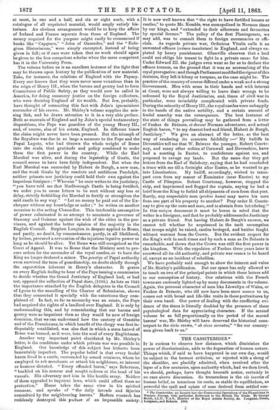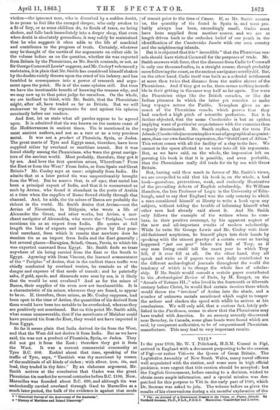THE CASSITERIDES.*
IT is curious to observe how distance, which diminishes the power of discrimination, adds to the dogmatism of human nature. Things which, if said to have happened in our own day, would be subject to the keenest criticism, or rejected with a shrug of the shoulder, are placidly admitted, when received after the lapse of a few centuries, upon authority which, had we then lived, we should, perhaps, have thought beneath notice, certainly in no case above discussion. So tremendous is the vis inertias of human belief, so tenacious its roots, so stable its equilibrium, so powerful the spell and opiate of ease derived from settled con- The Cassiterida ; an Inquiry into the Commercial Operations of the Phcenicians in Western Europe, with particular Reference to the British Tin Trade. By George Smith, LLD., F.A.S., Member of the Royal Asiatic Society, do. Longman, Green, Longman, and Roberta. 1863.
viction—the ignorant man, who is disturbed by a sudden doubt, is so prone to feel like the enraged sleeper, who only awakes to a fit of fury, or as some children do, to floods of tears, on being shaken, and falls back immediately into a deeper sleep, that even when doubt is absolutely groundless, it may safely be maintained that he who suggests it often adds to the life of mankind and contributes to the progress of truth. Certainly, whatever may be thought of the merits of the arguments on either side in the volume before us on the question, whether tin was exported from Britain by the Phoenicians, as Mr. Smith contends, or not, as Sir George Cornewall Lewis* suggests, and Mr. Cooleyt vehementl y maintains, it is plain that Mr. Smith has considered himself shaken by the doubts rudely thrown upon the creed of his infancy, and has tumbled in consequence into a power of research and argu- ment upon the point. He is of the same opinion still. But then we have the inestimable benefit of knowing the reasons why, and we may now up to that point judge for ourselves. On the whole, we are inclined to think, with Mr. Smith, that the Phoenicians might, after all, have traded as far as Britain. But we will endeavour to lay the arguments for and against his opiuion succinctly before our readers.
And first, let us state what all parties appear to be agreed upon. It is admitted that tin was known on the eastern coast of the Mediterranean in ancient times. Tin is mentioned in the most ancient authors, and not as a rare or as a very precious metal. It was not a product of Phoenicia, Syria, or Judea. The great marts of Tyre and Egypt must, therefore, have been supplied either by overland or maritime transit. But it was found chiefly among the Phoenicians, who svere the great naviga- tors of the ancient world. Most probably, therefore, they got it by sea. And here the first question arises, Wherefrom ? From the East or from the West? From India, or from Spain and Great Britain ? Mr. Cooley says at once: originally from India. He admits that at a later period tin was unquestionably brought from the West. But he asserts that, in all ages, that metal has been a principal export of India, and that it is enumerated as such by Arrian, who found it abundant in the ports of Arabia at a time when the supplies of Rome flowed chiefly through that channel. And, he adds, the tin mines of Bence are probably the richest in the world. Mr. Smith denies that Arrian—not the Arrian of Nicomedia, in Bithynia, who wrote a life of Alexander the Great, and other works, but Arrian, a mer- chant navigator of Alexandria, who wrote the " Periplus,"—ever mentions tin as an export from India. He quotes at full length the lists of exports and imports given by that prac- tical merchant, from which it results that nowhere does he mention tin as an import from India and the East generally ; but several places—Barugaza, Scindi, Oman, Persia, to which tin was exported eastward from Egypt. Mr. Smith finds no trace anywhere of tin being carried from the East or the South to Egypt. Agreeing with Dean Vincent, the learned commentator of the " Periplus "of Arrian, that in the earliest times traffic was chiefly conducted by overland routes, he reminds us of the danger and expense of that mode of transit ; and he pointedly asks, if gold, specie, and diamonds were sent by sea, is it likely that tin would be sent overland ? And as for the mines of Banos, their supplies of tin even now are inexhaustible. It is a characteristic of tin mines, wherever they are found, to appear to be so. If, therefore, these mines, as Mr. Cooley supposes, had been open in the time of Arrian, the quantities of tin derived from them would have been too notable to be overlooked, whereas they are positively not mentioned. But on this point Mr. Smith adds, what seems unanswerable, that if the merchants of Malabar could have procured tin from the East, they would not have imported it from Egypt.
So far it seems plain that India derived its tin from the West, and that the West did not derive it from India. But as we have said, tin was not a product of Phoenicia, Syria, or Judea. They did not get it from the East ; therefore they got it from the West. It was a current commercial commodity at Tyre B.C. 600. Ezekiel about that time, speaking of the traffic, of Tyre, says, " Tarshish was thy merchant by reason of the multitude of all kinds of riches ; with silver, iron, tin, and lead, they traded in thy fairs." By an elaborate argument, Mr. Smith arrives at the conclusion that Gades was the great Phoenician tin market for several centuries before B.C. 1100. Now, Marseilles was founded about B.C. 600, and although tin was undoubtedly carried overland through Gaul to Marseilles at a much later period, the bulk of the evidence is against that mode
• "Historical Survey of the Astronomy of the Ancients.", + "History of Maritime and Inland Discovery."
of transit prior to the time of Ctesar. If, as Mr. Smith assures us, the quantity of tin found in Spain is, and most pro- bably always has been, exceedingly small, Gades must have been supplied from another source, and we are at length driven back to the orthodox belief of our youth in the identification of the Cctssiterides Instate with our own country and the neighbouring islands.
But it is objected that itis " incredible" that the Phoenician ves- sels should have visited Cornwall for the purposes of trade. Mr. Smith answers with force, that the distance from Cadiz to Cornwall is only one thousand miles, in a straight course, though probably more following the coast, as the ancient navigators usually did. But, on the other hand, Cadiz itself was built as a colonial settlement at more than twice that distance from the native shores of the Phoenicians. And if they got so far, there seems nothing incredi- ble in their getting in the same way half as far again. Nor were the Phoenician ships like the British coracles, or like the Indian pinnaces in which the latter yet contrive to make long voyages across the Pacific. Xenophon gives an ac- couut of the Phoenician vessels, which proves that they had reached a high pitch of scientific perfection. But it is further objected, that the name Cassiterid es is but an epithet implying want of particular acquaintance with the countries thus. vaguely denominated. Mr. Smith replies, that the term Tin islands (Cassiterides) no more implies want of geograph ical acquaint- ance, than our own familiar expression, the" Gold Coast of Africa." This retort comes with all the facility of a slap in the face. We cannot in the space allotted to us enter into all his arguments. But, as we have said, on the whole, the impression left on pernsing his book is that it is possible, and even probable, that the Phoenicians really did trade for tin by sea with Great Britain.
But, having said thus much in favour of Mr. Smith's views, we are compelled to add that his book is, on the whole, a bad book—garrulous, pretentious, weak, and curiously illustrative of the prevailing defects of English scholarship. Sir William Hamilton, the late Professor of Logic in the University of Edin- burgh, used to say that England was the only country in which a man considered himself at liberty to write a book upon any subject, without taking the trouble of informing himself what other men had already said about it. And Mr. Smith only follows the example of the writers whom he com- bats, in their positive contempt, by his apparent neglect of the new and all-important results of modern scholarship. While he twits Sir George Lewis and Mr. Cooley with their old-fashioned scepticism, he himself plays into their bands by speaking with the utmost gravity of a certain event as having happened "just one year" before the fall of Troy, as if any man living could tell the exact year in which Troy
fell, if it ever fell at all. On the other hand, they all speak and write as if papers were not daily contributed to the different archroological journals throughout the world the tendency of which is to change the whole face of scholar- ship. If Mr. Smith would consult a certain paper contributed to the Archeological Review of Paris, by M. Rouget, on the "Annals of Totmes III.," who lived in the fourteenth or fifteenth century before Christ, he would find certain invoices there which would throw the "invoices" of Anima into the shade, and a number of unknown metals mentioned which ought to temper the ardour and slacken the speed with which he arrives at his conclusions. We will only add, that a curious fact, lately pub- lished in the Parthenon, seems to show that the Phoenicians may have traded with America. In an assuary recently discovered near Beverley, in Canada, some glass beads were found which are said, by competent authorities, to be of unquestioned Phoenician manufacture. This may lead to very important results.































 Previous page
Previous page